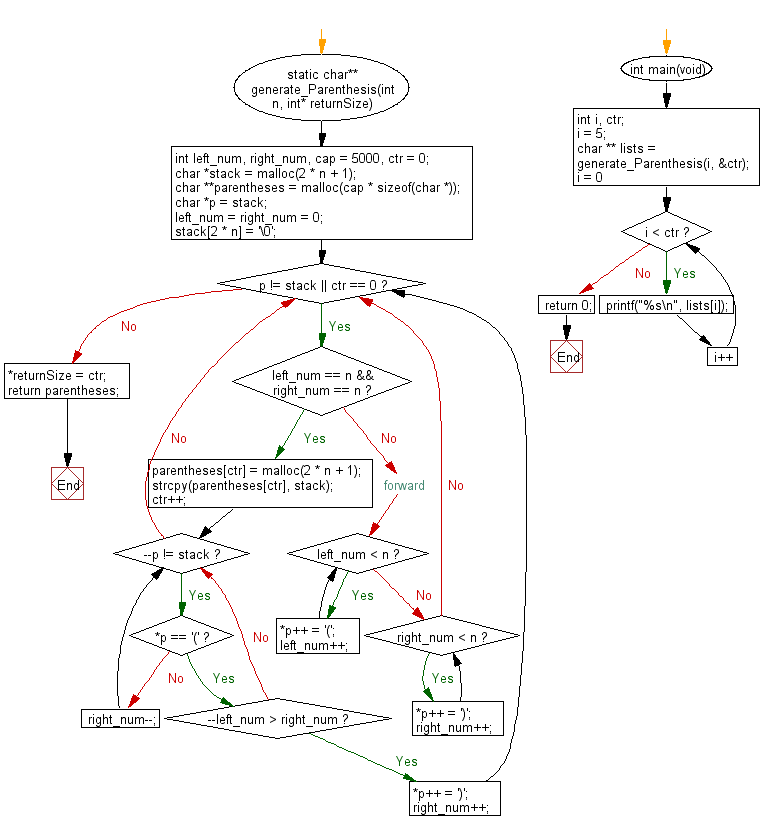C Exercises: Generate all combinations of well-formed parentheses from n given pairs of parentheses
C Programming Practice: Exercise-11 with Solution
Write a C programming to generate all combinations of well-formed parentheses from n given pairs of parentheses.
Example: Input n = 5 Output: (()())(()) (()())()() (())((())) (())(()()) (())(())() (())()(()) (())()()() ()(((()))) ()((()())) ()((())()) ()((()))() ()(()(())) ()(()()()) ()(()())() ()(())(()) ()(())()() ()()((())) ()()(()()) ()()(())() ()()()(()) ()()()()()
C Code:
#include <stdio.h>
#include <stdlib.h>
#include <string.h>
static char** generate_Parenthesis(int n, int* returnSize)
{
int left_num, right_num, cap = 5000, ctr = 0;
char *stack = malloc(2 * n + 1);
char **parentheses = malloc(cap * sizeof(char *));
char *p = stack;
left_num = right_num = 0;
stack[2 * n] = '\0';
while (p != stack || ctr == 0) {
if (left_num == n && right_num == n) {
parentheses[ctr] = malloc(2 * n + 1);
strcpy(parentheses[ctr], stack);
ctr++;
while (--p != stack) {
if (*p == '(') {
if (--left_num > right_num) {
*p++ = ')';
right_num++;
break;
}
} else {
right_num--;
}
}
} else {
/* forward */
while (left_num < n) {
*p++ = '(';
left_num++;
}
while (right_num < n) {
*p++ = ')';
right_num++;
}
}
}
*returnSize = ctr;
return parentheses;
}
int main(void)
{
int i, ctr;
i = 5;
char ** lists = generate_Parenthesis(i, &ctr);
for (i = 0; i < ctr; i++) {
printf("%s\n", lists[i]);
}
return 0;
}
Sample Output:
((((())))) (((()()))) (((())())) (((()))()) (((())))() ((()(()))) ((()()())) ((()())()) ((()()))() ((())(())) ((())()()) ((())())() ((()))(()) ((()))()() (()((()))) (()(()())) (()(())()) (()(()))() (()()(())) (()()()()) (()()())() (()())(()) (()())()() (())((())) (())(()()) (())(())() (())()(()) (())()()() ()(((()))) ()((()())) ()((())()) ()((()))() ()(()(())) ()(()()()) ()(()())() ()(())(()) ()(())()() ()()((())) ()()(()()) ()()(())() ()()()(()) ()()()()()
Flowchart:

C Programming Code Editor:
Contribute your code and comments through Disqus.
Previous: Write a C programming to check if a given string is valid or not, the string contains the characters '(', ')', '{', '}', '[' and ']'. The string is valid if the open brackets must be closed by the same type of brackets and in correct order.
Next: Write a C program to remove the duplicates from a given array of integers.
What is the difficulty level of this exercise?
Test your Programming skills with w3resource's quiz.
C Programming: Tips of the Day
Static variable inside of a function in C
The scope of variable is where the variable name can be seen. Here, x is visible only inside function foo().
The lifetime of a variable is the period over which it exists. If x were defined without the keyword static, the lifetime would be from the entry into foo() to the return from foo(); so it would be re-initialized to 5 on every call.
The keyword static acts to extend the lifetime of a variable to the lifetime of the programme; e.g. initialization occurs once and once only and then the variable retains its value - whatever it has come to be - over all future calls to foo().
Ref : https://bit.ly/3fOq7XP
- New Content published on w3resource:
- HTML-CSS Practical: Exercises, Practice, Solution
- Java Regular Expression: Exercises, Practice, Solution
- Scala Programming Exercises, Practice, Solution
- Python Itertools exercises
- Python Numpy exercises
- Python GeoPy Package exercises
- Python Pandas exercises
- Python nltk exercises
- Python BeautifulSoup exercises
- Form Template
- Composer - PHP Package Manager
- PHPUnit - PHP Testing
- Laravel - PHP Framework
- Angular - JavaScript Framework
- Vue - JavaScript Framework
- Jest - JavaScript Testing Framework
